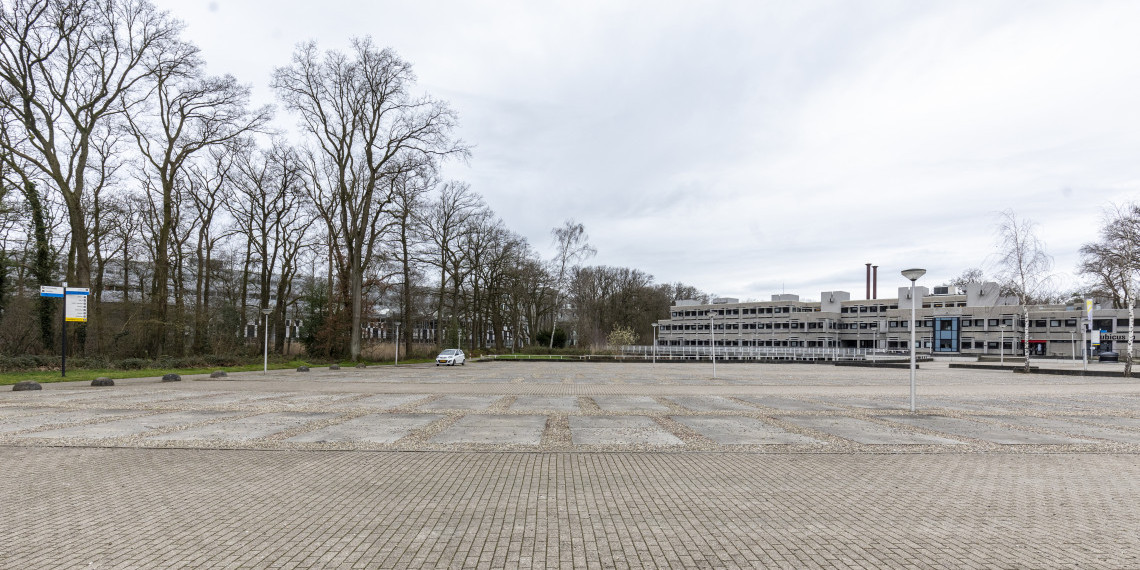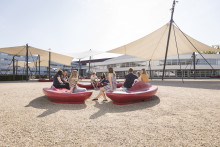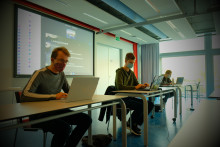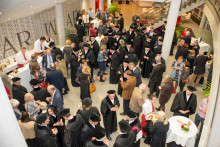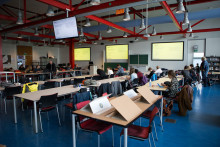The government's current advice is clear: work from home at least half of the time - if circumstances permit. HR manager Netty Kollen says that within her department it depends on personal wishes and the range of tasks. ‘Myself, I am a people person. Sitting at home behind a screen for five days is not something I can bear. The hybrid work, in which I work on campus for three days and at home for two, works well.’
Kollen’s group divides the days among colleagues so that there is always someone present on the work floor. ‘I think it is part of our job to be partly present on campus. Sometimes, as an HR employee, you need to be able to quickly join a meeting, for example.’
Organically
At the Civil Engineering & Management department, they leave the implementation of working from home to their colleagues, says professor André Dorée. ‘Some prefer to work at home for two days, others would rather not come to the campus at all. And then some prefer to work a bit more at the UT because of small children or because they have a smaller living space. The department does pay extra attention to our PhDs and PDEngs. There is a risk that they will wither away at home or become isolated, and we must try to prevent that.’
There are no really strict agreements, Dorée says. The department allows hybrid working to happen mostly ‘organically’. ‘In the beginning, we had spreadsheets to keep track of the presence of colleagues. But actually we were all solving a problem that did not exist. Because of the working from home, most people were able to find a working place.’ According to him, there is another advantage to the new situation. ‘Before, Twente was always at a disadvantage during national meetings. Relatively speaking, we always had to travel the farthest. The online meetings have removed this disadvantage.’
Tasks
Working from home or not very much depends on the preference and range of tasks of colleagues, says Lieke Schreel, director of the Centre for Educational Support (CES). The departments within her service are very diverse; it is not possible to make a clear-cut arrangements, according to Schreel. ‘I work about two or three days on campus. I live in The Hague and cannot ‘just’ come to the UT for a day. But when I am there, I immediately notice how important it is to see colleagues physically.’
Schreel began her new position as director of CES in April. At the time, the Netherlands was still in the tail end of the last hard lockdown. ‘There was even a curfew. I started my first working day at home at the same desk and with the same screen, only my laptop was new. It was very strange to start like this. You prefer to meet new colleagues in person.’
'For some people, working from home a hundred percent of the time is just not doable. That is also something for politics to think about’
Touching
All those involved agree that the past period, in which it was possible to work more on campus, was a relief. Dirk Heylen, chairman of the Human Media Interaction department, recently organised a physical ‘winter school’ for fifty PhD students. ‘You could feel the energy and creativity during the meeting. Everyone was extremely happy to see each other again and to get to know each other. I found it moving and amazing to see.’
According to him, first- and second-year PhD students paid a high price for the lockdowns. ‘They miss out on part of their academic training. After all, it’s not just about writing the dissertation. You also become a member of the academic community. That includes physical conversations with colleagues, and that has been a lot less common lately.’
According to Heylen, even science in general suffers. ‘Of course, working from home has many advantages. The extra half hour of sleeping in is nice and you are not always disturbed by people knocking on your door. But it is also more difficult to keep each other focused. We are back in the 1950s, when scientists wrote letters to each other. To be honest, I think the scientific quality has deteriorated in the past two years.’
That is why Heylen hopes for a combination of working from home and being together on campus in the future. HR manager Kollen also emphasizes the importance of working on campus. ‘Especially for the psychological well-being of the employees. For some people, working from home a hundred percent of the time is just not doable. That is also something for politics to think about.’
'If we can prevent students from having to follow online education again by working from home a bit more, then I'm happy to do so'
Students
On the eve of new measures, Dorée is particularly concerned about education. ‘Last year, we managed to quickly switch to online education during lockdowns. That transition went better than expected, but people were running out of steam. I haven't heard much positive feedback from colleagues about online education, particularly lectures.’
Supervising graduates or meetings in small groups work just fine online, Dorée says. But for lectures, it's a different story. ‘As a lecturer you are talking into a black hole, as it were, and it takes a lot of energy. In lectures, lecturers want to make contact with students. Physical education is essential for the experience of work and pleasure as a teacher. Hybrid working is possible, but hybrid lectures are very complicated. And because of recordings, the safety of the classroom is at risk.’
Schreel also hopes that completely online education will not return. ‘There was more space to go to the bar than for physical education. I found that frustrating to see and terrible for students. If we can prevent students from having to follow online education again by working from home a bit more, then I'm happy to do so. At the end of the day, it's all about the students at the UT. That's what we do it for.’


